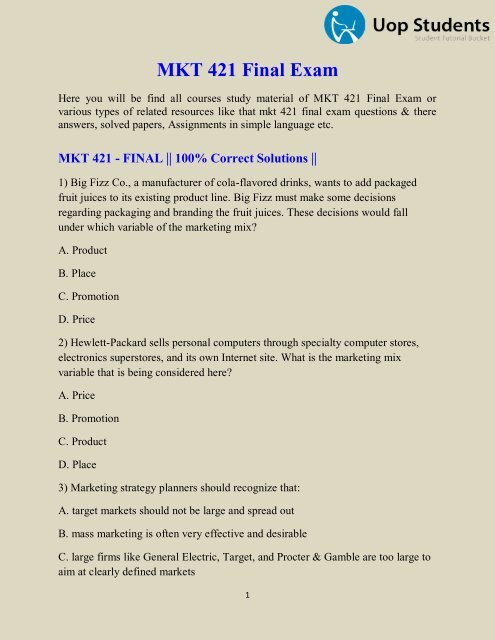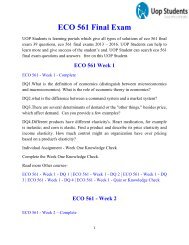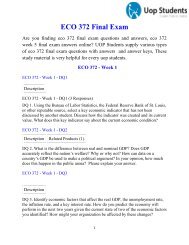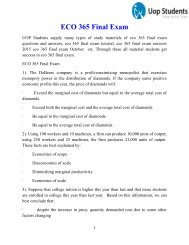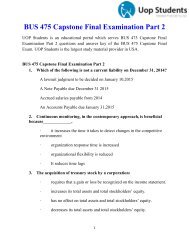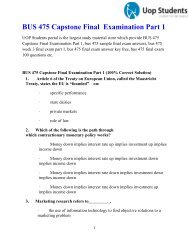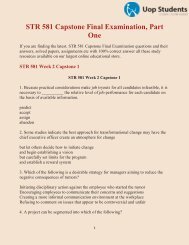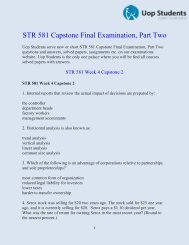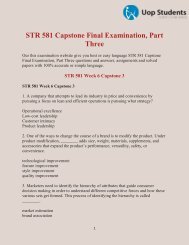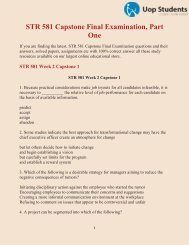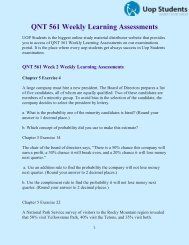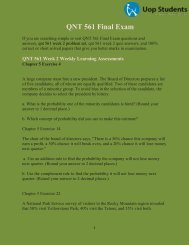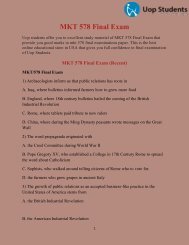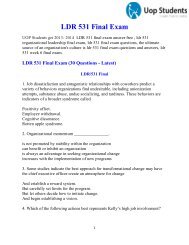UOP Students - MKT 421 Final Exam | MKT 421 Final Exam Complete
UOP students furnish 100% pure or easy to understandable MKT 421 Final Exam answer free, assignments, questions & solved papers in USA. Through these study materialevery uop students get good marks in their final examinations. Because Uop students serve always simple study resources for uop students. Know more about related courses.Read more just Click here. http://www.uopstudents.com/mkt-421
UOP students furnish 100% pure or easy to understandable MKT 421 Final Exam answer free, assignments, questions & solved papers in USA. Through these study materialevery uop students get good marks in their final examinations. Because Uop students serve always simple study resources for uop students. Know more about related courses.Read more just Click here.
http://www.uopstudents.com/mkt-421
You also want an ePaper? Increase the reach of your titles
YUMPU automatically turns print PDFs into web optimized ePapers that Google loves.
<strong>MKT</strong> <strong>421</strong> <strong>Final</strong> <strong>Exam</strong><br />
Here you will be find all courses study material of <strong>MKT</strong> <strong>421</strong> <strong>Final</strong> <strong>Exam</strong> or<br />
various types of related resources like that mkt <strong>421</strong> final exam questions & there<br />
answers, solved papers, Assignments in simple language etc.<br />
<strong>MKT</strong> <strong>421</strong> - FINAL || 100% Correct Solutions ||<br />
1) Big Fizz Co., a manufacturer of cola-flavored drinks, wants to add packaged<br />
fruit juices to its existing product line. Big Fizz must make some decisions<br />
regarding packaging and branding the fruit juices. These decisions would fall<br />
under which variable of the marketing mix?<br />
A. Product<br />
B. Place<br />
C. Promotion<br />
D. Price<br />
2) Hewlett-Packard sells personal computers through specialty computer stores,<br />
electronics superstores, and its own Internet site. What is the marketing mix<br />
variable that is being considered here?<br />
A. Price<br />
B. Promotion<br />
C. Product<br />
D. Place<br />
3) Marketing strategy planners should recognize that:<br />
A. target markets should not be large and spread out<br />
B. mass marketing is often very effective and desirable<br />
C. large firms like General Electric, Target, and Procter & Gamble are too large to<br />
aim at clearly defined markets<br />
1
D. target marketing is not limited to small market segments<br />
4) Target marketing, in contrast to mass marketing,<br />
A. is limited to small market segments<br />
B. assumes that all customers are basically the same<br />
C. ignores markets that are large and spread out<br />
D. focuses on fairly homogeneous market segments<br />
5) The process of naming broad product-markets and then dividing them in order<br />
to select target markets and develop suitable<br />
A. market penetration<br />
B. market segmentation<br />
C. market development<br />
D. market research<br />
6) ______________ is the process of naming broad product-markets and then<br />
segmenting these broad product-markets in order to select target markets and<br />
develop suitable marketing mixes.<br />
A. Market positioning<br />
B. Market segmentation<br />
C. Mass marketing<br />
D. Diversification<br />
7) Marketing research which seeks structured responses that can be summarized is<br />
called<br />
A. focus group research<br />
B. quantitative research<br />
C. qualitative research<br />
2
D. situation analysis research<br />
8) One of the major disadvantages of the focus group interview approach is that<br />
A. ideas generated by the group cannot be tested later with other research<br />
B. it is difficult to measure the results objectively<br />
C. it is difficult to get in-depth information about the research topic<br />
D. there is no interviewer, so the research questions may not be answered<br />
9) When focus group interviews are used in marketing,<br />
A. each person in the group answers the same questionnaire, to focus the<br />
discussion<br />
B. the typical group size is 15 to 20 typical consumers whether online or off-line<br />
C. it is primarily as a follow-up to more quantitative research<br />
D. the research conclusions will vary depending on who watches the interview<br />
whether online or off-line<br />
10) Focus groups<br />
A. are usually composed of 10 to 15 people as participants<br />
B. yield results that are largely dependent on the viewpoint of the researcher<br />
C. always do a good job of representing the broader target market<br />
D. have a low cost per participant<br />
11) A small manufacturing firm has just experienced a rapid drop in sales. The<br />
marketing manager thinks that he knows what the problem is and has been<br />
carefully analyzing secondary data to check his thinking. His next step should be to<br />
A. conduct an experiment<br />
B. develop a formal research project to gather primary data<br />
3
C. conduct informal discussion with outsiders, including intermediaries, to see if<br />
he has correctly defined the problem<br />
D. develop a hypothesis and predict the future behavior of sales<br />
12) The marketing manager at Massimino & McCarthy, a chain of retail stores that<br />
sells men's clothing, is reviewing marketing research data to try to determine if<br />
changes in marketing strategy are needed. Which of the following sources of data<br />
would be a secondary data source?<br />
A. Looking through the company's marketing information system to see past sales<br />
trends<br />
B. Reviewing videotapes of a recent focus group<br />
C. Making phone calls to some of the best customers to learn their interest in a new<br />
line of clothing<br />
D. Spending time in stores observing customers' behavior<br />
13) Which of the following statements about consumer products is true?<br />
A. Convenience products are those that customers want to buy at the lowest<br />
possible price.<br />
B. Shopping products are those products for which customers usually want to use<br />
Routinized buying behavior.<br />
C. Specialty products are those that customers usually are least willing to search<br />
for.<br />
D. Unsought products are not shopped for at all.<br />
14) The attitudes and behavior patterns of consumers making a purchasing decision<br />
are part of the<br />
A. political environment<br />
B. social and cultural environment<br />
C. competitive environment<br />
4
D. firm's resources and objectives<br />
15) The observing method in marketing research<br />
A. uses personal interviews<br />
B. may require customers to change their normal shopping behavior<br />
C. is used to gather data without consumers being influenced by the process<br />
D. is not suitable for obtaining primary data<br />
16) The first step in market segmentation should be<br />
A. deciding what new product you could develop<br />
B. evaluating what segments you currently serve<br />
C. finding a demographic group likely to use your products<br />
D. defining some broad product-markets where you may be able to operate<br />
profitably<br />
17) The product life cycle<br />
A. describes the stages a new product idea goes through from beginning to end<br />
B. has three major stages<br />
C. applies to categories or types of products as opposed to brands<br />
D. shows that sales and profits tend to move together over time<br />
18) Which of the following is one of the product life cycle stages?<br />
A. Market analysis<br />
B. Market growth<br />
C. Market feedback<br />
D. Market research<br />
5
19) While watching a television program, Liza gets a phone call just as a<br />
commercial is starting. She presses the mute button on the television's remote<br />
control and takes the call, so she pays no attention to the commercial. In terms of<br />
the communication process, the telephone call is an example of what?<br />
A. Encoding<br />
B. Noise<br />
C. Decoding<br />
D. Feedback<br />
20) Which of the following functions are performed by wholesalers in the channel<br />
of distribution?<br />
A. Providing information to retailers<br />
B. Placing radio advertisements for retailers<br />
C. Placing newspaper advertisements for retailers<br />
D. Providing goals for retailers<br />
21) Typically the ______________ and the marketing manager are responsible for<br />
building good distribution channels and implementing place policies.<br />
A. public relations manager<br />
B. sales manager<br />
C. advertising manager<br />
D. human resources manager<br />
22) SGCA is having a sales contest to encourage retailers to quickly reduce the<br />
inventory of Super Gamer computers. Retailers with the highest sales during the<br />
next month win an expense paid trip to a special dealer meeting at a resort in<br />
Hawaii. This is<br />
A. probably illegal because it might encourage price competition among retailers<br />
6
B. an example of cooperative advertising<br />
C. the type of promotion that continues to impact sales even after the promotion is<br />
over<br />
D. an example of a manufacturer using trade sales promotion in the channel<br />
23) Advertising allowances<br />
A. are incentive monies given to firms further along in the channel to encourage<br />
them to advertise or otherwise promote the firm's products<br />
B. involve intermediaries and producers sharing in the cost of ads<br />
C. allow for coordination and integration of ad messages in the channel<br />
D. set the allowance amount as a percent of the retailer's actual purchases<br />
24) Price reductions given to channel members to encourage them to promote or<br />
otherwise promote a firm's products locally are<br />
A. quantity discounts<br />
B. brokerage allowances<br />
C. push money allowances<br />
D. advertising allowances<br />
25) A producer using very aggressive promotion to get final consumers to ask<br />
intermediaries for a new product has<br />
A. a pulling policy<br />
B. a target marketing policy<br />
C. a selective distribution policy<br />
D. a pushing policy<br />
26) Nantucket Hammocks, Inc., uses dealer incentives, discounts, and sales<br />
contests in order to encourage retailers to give special attention to selling its<br />
products. Nantucket Hammocks is using<br />
7
A. exclusive distribution<br />
B. a corporate channel system<br />
C. dual distribution<br />
D. pushing<br />
27) Quality Ceramic, Inc., (QCI) defined five submarkets within its broad productmarket.<br />
To obtain some economies of scale, QCI decided NOT to offer each of the<br />
submarkets a different marketing mix. Instead, it selected two submarkets whose<br />
needs are fairly similar, and is counting on promotion and minor product<br />
differences to make its one basic marketing mix appeal to both submarkets. QCI is<br />
using the<br />
A. combined target market approach<br />
B. single target market approach<br />
C. multiple target market approach<br />
D. mass marketing approach<br />
28) When segmenting broad product-markets, cost considerations tend<br />
A. to encourage managers to disregard the criterion that a product-market segment<br />
should be substantial<br />
B. to lead to more aggregating<br />
C. to be unimportant as long as the segmenting dimensions are operational<br />
D. to lead to a large number of small, but very homogeneous, product-market<br />
segments<br />
29) ______________ focuses on introducing new products to existing markets.<br />
A. Market development<br />
B. Product development<br />
C. Diversification<br />
8
D. Market penetration<br />
30) When a company grows globally by introducing existing product lines to new<br />
markets, this is an example of what?<br />
A. Market development<br />
B. Product development<br />
C. Diversification<br />
D. Market penetration<br />
<strong>MKT</strong> <strong>421</strong> <strong>Final</strong> <strong>Exam</strong> (Latest - Dec 2014)<br />
1. Compared with other approaches to business, the marketing concept is distinct<br />
in that it:<br />
Produces new products and services.<br />
Focuses on satisfying customers' needs.<br />
Focuses on sales.<br />
Creates a broad assortment of products.<br />
2. The sales analysis of a product revealed that profits were highest when it was<br />
initially introduced into the market with a high selling price. However, the price<br />
was gradually reduced as it started facing competition as substitutes entered the<br />
market. This is an example of a (n) _____.<br />
Skimming price policy<br />
Introductory price dealing<br />
Penetration price policy<br />
Temporary price cut policy<br />
3. Behavioral targeting:<br />
9
Delivers ads to consumers based on previous websites the customer has visited.<br />
Tries to reach target customers who are actually interested in what the firm has to<br />
communicate.<br />
Tries to place ads on websites that are designed to appeal to the firm's target<br />
market.<br />
Allows advertisers to pay only when a customer clicks on the ad and links to the<br />
advertiser's website.<br />
4. Which of the following is true of direct distribution?<br />
It requires a significant investment in facilities.<br />
Direct distribution always serves customer needs better and at a lower cost.<br />
Most firms selling consumer products rely on direct distribution.<br />
It reduces a producer's need for working capital.<br />
5. The three basic sales tasks are:<br />
Order-closing, order-opening, and sales-promoting.<br />
Order-taking, missionary selling, and order-getting.<br />
Order-taking, supporting, and order-getting.<br />
Order-taking, order-managing, and order-getting.<br />
6. A useful tool for organizing the competitor analysis is:<br />
The oligopoly chart.<br />
The competitive summary.<br />
A competitor matrix.<br />
Rivals chart.<br />
7. Marketers cannot assume that a product that meets consumer needs in one<br />
country will do so in another. This is because:<br />
10
The purchase situations may be different.<br />
Family life cycles may be different.<br />
Many wants are culturally learned.<br />
Economic wants do not influence purchases in many regions of the world.<br />
8. The main difference between the "marketing department era" and the "marketing<br />
company era" is:<br />
More emphasis on short-run planning in the marketing company era.<br />
More emphasis on selling and advertising in the marketing department era.<br />
Whether the president of the firm has a background in marketing.<br />
Whether the whole company is customer-oriented.<br />
9. David Oreck advertises Oreck vacuum cleaners via commercials that run on<br />
national radio programs. He encourages consumers to "…try my 8-pound Oreck<br />
vacuum for free for 30 days," and to return it if they aren't satisfied. He then<br />
provides an easy-to-remember toll-free telephone number that consumers can use<br />
to place orders. Regarding the AIDA model, the free-trial period and availability of<br />
a toll-free number are devices used mainly to:<br />
Obtain action.<br />
Hold interest.<br />
Arouse desire.<br />
Get attention.<br />
10. More than 600,000 loyal customers signed up in advance to purchase the<br />
iPhone4 in an Apple store the first day it was available for sale in the U.S. What<br />
type of response behavior were these Apple followers demonstrating?<br />
Routinized response<br />
Low-involvement buying<br />
11
Limited problem solving<br />
Dissonance response<br />
11. Because she frequently buys books at Amazon.com, Sophie Soleil set up an<br />
account and password at the website. Now, when she logs on and searches for a<br />
specific book, a note pops up at the center of her laptop screen saying: "Hello,<br />
Sophie, we have recommendations for you," and proceeds to list other titles that<br />
Sophie might enjoy based on her previous purchases. Amazon can remember<br />
Sophie (and her previous purchases) because the online retailer uses:<br />
Banners.<br />
Cookies.<br />
Encoding.<br />
Decoding.<br />
12. When an advertiser pays a fixed amount (e.g. 70 cents) each time a Web surfer<br />
clicks on the advertiser's ad and links to the advertiser's website, this process is<br />
called a(n):<br />
pay-per-click.<br />
copy thrust.<br />
pay-per-view.<br />
pioneering ad.<br />
13. According to the concept of social responsibility, a firm has a duty to:<br />
Conduct business in a way that is good for society as a whole, both now and for the<br />
future.<br />
Communicate regularly with the public.<br />
Place profit above all other considerations.<br />
Place customer satisfaction above all other considerations.<br />
12
14. Which of the following is a common cause of new product failures?<br />
The company delays putting the product on the market until it develops a complete<br />
marketing plan.<br />
The company tries to follow an organized new-product development process—<br />
rather than using a faster and more spontaneous, "race-to-market" approach.<br />
The product fails to offer the customer a unique benefit.<br />
The managers worry too much about the competition.<br />
15. Tammi So loft has itchy eyes and a stuffy nose, and suddenly becomes aware<br />
of many TV ads for allergy products that she never noticed before. This illustrates:<br />
reinforced cognition.<br />
selective perception.<br />
selective exposure.<br />
selective retention.<br />
16. Genetech Corp. has invested heavily to develop a patented new product.<br />
Genetech wants to achieve a rapid return on its investment. It probably should set a<br />
______________ pricing objective.<br />
Profit maximization<br />
Sales-oriented<br />
Status quo<br />
Target return<br />
17. When a company provides its advertising agency with a statement about a new<br />
product to use in designing an advertising campaign, and this statement includes a<br />
description of the target market, the product type, the primary benefits of using the<br />
product, and how this product is different from, and better than, competitive<br />
products, what type of statement is this?<br />
Qualifying<br />
13
Positioning<br />
Clustering<br />
Determining<br />
18. The advantages of working with an intermediary usually increase when there<br />
is:<br />
A greater number of customers.<br />
Little distance between customers.<br />
A smaller number of competing products.<br />
Excellent communication with customers.<br />
19. When new product ideas are chosen based on ratings and comments from<br />
customers, this process is called ______.<br />
Reaction engineering<br />
Creative resourcing<br />
Crowd sourcing<br />
Idea engineering<br />
20. In the 1990s, DVDs replaced audiocassettes and floppy disks as the storage<br />
media of choice for music and computers. At which stage of the product life cycle<br />
is the DVD today?<br />
Sales decline<br />
Market introduction<br />
Market extinction<br />
Market immaturity<br />
21. The primary purpose of branding is:<br />
To prevent competitors from stealing product ideas.<br />
14
To identify a product.<br />
To boost customer satisfaction.<br />
To enhance package design.<br />
22. Clearwater Office Supply sells frequently purchased office supplies to<br />
businesses in a metropolitan area. It is a well-established company with a large<br />
share of the market. Its promotion should probably focus on:<br />
Reminding.<br />
Informing.<br />
Stimulating primary demand.<br />
Innovators.<br />
23. The main difference between a "marketing strategy" and a "marketing plan" is<br />
that:<br />
A marketing strategy provides more detail.<br />
Time-related details are included in a marketing plan.<br />
A marketing plan includes several marketing strategies.<br />
A marketing strategy omits pricing plans.<br />
24. From the perspective of macro-marketing, e-commerce specialists CarFax<br />
(which provides vehicle history reports) and Cars.com (a website offering auto<br />
comparison shopping) have emerged within the auto industry because:<br />
The information they provide makes the exchange process between producers and<br />
consumers more efficient and effective.<br />
The role of the automotive sales person is becoming obsolete.<br />
Auto manufacturers need to sell direct to consumers.<br />
The market needs competitive rivals to auto dealerships.<br />
15
25. In the American Marketing Association's Statement of Ethics, which ethical<br />
value stresses a firm's attempts to balance the needs of its buyers with the interests<br />
of sellers?<br />
Citizenship<br />
Responsibility<br />
Honesty<br />
Fairness<br />
26. Most firms in the business world set their prices using:<br />
Demand-oriented price setting.<br />
Federal price guidelines.<br />
Supply and demand analysis.<br />
Cost-oriented price setting.<br />
27. A producer might use a "pulling policy" rather than a "pushing policy" if:<br />
Intermediaries are reluctant to handle a new product.<br />
Its sales force has been very successful getting wholesalers and retailers to handle<br />
its product.<br />
It is offering a very "high-tech" product to a small product-market.<br />
It has a very limited promotion budget.<br />
28. The phrase "big data" refers to:<br />
the top five firms in the marketing research industry.<br />
the use of marketing research in big marketing decisions.<br />
the massive amount of data being collected and processed by today's organizations.<br />
marketing research data taken from Internet sources.<br />
16
29. In which quadrant of the SWOT analysis tool does the following fit? A firm is<br />
in a fast-growing industry.<br />
Weaknesses<br />
Opportunities<br />
Strengths<br />
Threats<br />
30. Blending the firm's promotion efforts to convey a complete and consistent<br />
message is the goal of:<br />
Sales promotion communications.<br />
Integrated marketing communications.<br />
Integrated promotional marketing.<br />
Sales management communications.<br />
<strong>MKT</strong> <strong>421</strong> - Week 1 - <strong>Complete</strong><br />
Week 1<br />
DQ 1. What is the definition of marketing? What are the benefits and drawbacks of<br />
incorporating marketing into the sales function of an organization? Do you think<br />
that marketing should be included as part of the sales organization within a<br />
company? Explain why or why not.<br />
DQ 2. Assume you are the newly hired marketing manager of a company. As you<br />
spend time with other peer marketing managers, you realize that the company does<br />
not place an emphasis on planning within the marketing organization. Why is<br />
planning important in marketing? What are the essential components of a<br />
marketing plan? How would you convince your supervisor that the marketing<br />
department should produce formal marketing plans?<br />
17
DQ 3. Select an organization with which you are familiar. How does your selected<br />
organization use the different components of the marketing mix? How does the<br />
marketing mix affect the development of your selected organization’s marketing<br />
strategy and tactics? How can your selected organization use quantifiable elements<br />
to evaluate, monitor, and control marketing effectiveness?<br />
DQ 4. What is the definition of marketing? How is it different from sales?<br />
Individual Assignment - Defining Marketing Paper<br />
Write a 700- to 1,050-word paper in which you define marketing.<br />
· Include your personal definition of marketing and definitions from two<br />
different sources.<br />
· Explain the importance of marketing in organizational success, based on<br />
these definitions.<br />
· Provide at least three examples from the business world to support your<br />
explanation. Properly cite sources used in the paper.<br />
<strong>MKT</strong> <strong>421</strong> - Week 1 - Defining Marketing Paper (3 Sets)<br />
Individual Assignment - Defining Marketing Paper<br />
Write a 700- to 1,050-word paper in which you define marketing.<br />
· Include your personal definition of marketing and definitions from two<br />
different sources.<br />
· Explain the importance of marketing in organizational success, based on<br />
these definitions.<br />
· Provide at least three examples from the business world to support your<br />
explanation. Properly cite sources used in the paper.<br />
<strong>MKT</strong> <strong>421</strong> - Week 1 - DQ 1<br />
What is the definition of marketing? What are the benefits and drawbacks of<br />
incorporating marketing into the sales function of an organization? Do you think<br />
18
that marketing should be included as part of the sales organization within a<br />
company? Explain why or why not.<br />
<strong>MKT</strong> <strong>421</strong> - Week 1 - DQ 2<br />
Assume you are the newly hired marketing manager of a company. As you spend<br />
time with other peer marketing managers, you realize that the company does not<br />
place an emphasis on planning within the marketing organization. Why is planning<br />
important in marketing? What are the essential components of a marketing plan?<br />
How would you convince your supervisor that the marketing department should<br />
produce formal marketing plans?<br />
<strong>MKT</strong> <strong>421</strong> - Week 1 - DQ 3 (2 Responses)<br />
Select an organization with which you are familiar. How does your selected<br />
organization use the different components of the marketing mix? How does the<br />
marketing mix affect the development of your selected organization’s marketing<br />
strategy and tactics? How can your selected organization use quantifiable elements<br />
to evaluate, monitor, and control marketing effectiveness?<br />
<strong>MKT</strong> <strong>421</strong> - Week 1 - DQ 4<br />
What is the definition of marketing? How is it different from sales?<br />
<strong>MKT</strong> <strong>421</strong> - Week 1 – Summary<br />
<strong>MKT</strong> <strong>421</strong> - Week 2 - <strong>Complete</strong><br />
Week 2<br />
DQ 1. What is marketing research? How has the Internet affected marketing<br />
research? As a part of your answer, address time, cost, approaches, and validity.<br />
Why is marketing research important to developing marketing strategy?<br />
DQ 2. What is competitive intelligence? What is the importance of competitive<br />
intelligence and analysis in modern-day marketing? How can a company’s<br />
marketing organization ensure that it is able to identify newly emerging<br />
19
competitors in time to plan and execute an effective marketing strategy in response<br />
to these competitors?<br />
DQ 3. What are the different types of buyers and consumers? How does the type of<br />
buyer or consumer affect marketing strategy? As part of your response, consider<br />
the characteristics of buyers and the factors that influence their purchasing<br />
decision. How can an organization ensure that their market strategy is appropriate<br />
for their target market?<br />
Individual Assignment - Marketing Mix Paper<br />
Write a 1,400- to 1,750-word paper in which you describe the elements of the<br />
marketing mix: product, place, price, and promotion. Include the following:<br />
· Select an organization with which you are familiar and describe how each<br />
one of the four elements of the marketing mix affects the development of the<br />
organization’s marketing strategy and tactics.<br />
· Describe how each element is implemented.<br />
· Identify your selected organization and the industry in which it exists.<br />
Format your paper consistent with APA guidelines.<br />
Learning Team Assignment - Marketing Plan - Phase I<br />
Create a new product or service for an existing organization. This product or<br />
service will be the basis for your Marketing Plan Paper. Obtain your instructor’s<br />
approval of your product or service before beginning this project.<br />
Write a 1,400- to 1,750-word paper that includes the following:<br />
· An overview of the existing organization<br />
· A description of the new product or service<br />
· An explanation of the importance of marketing to your selected<br />
organization’s success<br />
· A SWOTT (strengths, weaknesses, opportunities, threats, and trends)<br />
analysis on the new product or service<br />
20
· The marketing research approach you would use to develop the marketing<br />
strategy and tactics for this new product or service<br />
Refer to the Marketing Plan Outline located on the student website for the general<br />
framework of the Marketing Plan.<br />
<strong>MKT</strong> <strong>421</strong> - Week 2 - DQ 1<br />
What is marketing research? How has the Internet affected marketing research? As<br />
a part of your answer, address time, cost, approaches, and validity. Why is<br />
marketing research important to developing marketing strategy?<br />
<strong>MKT</strong> <strong>421</strong> - Week 2 - DQ 2<br />
What is competitive intelligence? What is the importance of competitive<br />
intelligence and analysis in modern-day marketing? How can a company’s<br />
marketing organization ensure that it is able to identify newly emerging<br />
competitors in time to plan and execute an effective marketing strategy in response<br />
to these competitors?<br />
<strong>MKT</strong> <strong>421</strong> - Week 2 - DQ 3<br />
What are the different types of buyers and consumers? How does the type of buyer<br />
or consumer affect marketing strategy? As part of your response, consider the<br />
characteristics of buyers and the factors that influence their purchasing decision.<br />
How can an organization ensure that their market strategy is appropriate for their<br />
target market?<br />
<strong>MKT</strong> <strong>421</strong> - Week 2 - Marketing Mix Paper<br />
Individual Assignment - Marketing Mix Paper<br />
Write a 1,400- to 1,750-word paper in which you describe the elements of the<br />
marketing mix: product, place, price, and promotion. Include the following:<br />
· Select an organization with which you are familiar and describe how each<br />
one of the four elements of the marketing mix affects the development of the<br />
organization’s marketing strategy and tactics.<br />
· Describe how each element is implemented.<br />
21
· Identify your selected organization and the industry in which it exists.<br />
<strong>MKT</strong> <strong>421</strong> - Week 2 - Marketing Plan - Phase I<br />
Learning Team Assignment - Marketing Plan - Phase<br />
Create a new product or service for an existing organization. This product or<br />
service will be the basis for your Marketing Plan Paper. Obtain your instructor’s<br />
approval of your product or service before beginning this project.<br />
Write a 1,400- to 1,750-word paper that includes the following:<br />
· An overview of the existing organization<br />
· A description of the new product or service<br />
· An explanation of the importance of marketing to your selected<br />
organization’s success<br />
· A SWOTT (strengths, weaknesses, opportunities, threats, and trends)<br />
analysis on the new product or service<br />
· The marketing research approach you would use to develop the marketing<br />
strategy and tactics for this new product or service<br />
Refer to the Marketing Plan Outline located on the student website for the general<br />
framework of the Marketing Plan.<br />
<strong>MKT</strong> <strong>421</strong> - Week 3 - <strong>Complete</strong><br />
Week 3<br />
DQ 1. Select a product with which you are familiar. What stage is your selected<br />
product at in the product life cycle? Provide rationale for your answer. Based on<br />
your knowledge of the product life cycle, what types of changes will occur to your<br />
selected product as it continues through the product life cycle? How will this affect<br />
the marketing of your selected product?<br />
DQ 2. Select a product or service. Then select three different organizations that<br />
provide your selected product or service and compare the prices associated with<br />
22
your selected product or service. What is the difference between the prices among<br />
the different organizations? What is the rationale for this difference?<br />
Individual Assignment - Marketing Research Paper<br />
Resource: Kindler Fine Foods Virtual Organization<br />
Use the Virtual Organization link on the student website to access additional<br />
company information on Kudler Fine Foods.<br />
Write a 1,050- to 1,400-word paper in which you justify the importance of<br />
marketing research in developing Kudler Fine Foods’ marketing strategy and<br />
tactics. Include the following:<br />
· Identify the areas where additional market research is needed.<br />
· Analyze the importance of competitive intelligence and analysis regarding<br />
the development of Kudler Fine Foods’ marketing strategy and tactics.<br />
Format your paper consistent with APA guidelines.<br />
Learning Team Assignment - Marketing Plan - Phase II<br />
Use the product or service you selected for your Marketing Plan: Phase I Paper.<br />
Write a 1,400- to 1,750-word paper in which you address the following:<br />
· Identify the segmentation criteria that will affect your target market<br />
selection.<br />
· Identify your target market.<br />
· Describe the organizational buyers and consumers of your product or service<br />
and the factors that influence their purchasing decisions. Discuss how these factors<br />
will affect your marketing strategy.<br />
· Analyze current competitors and define the competitive landscape for your<br />
product or service.<br />
<strong>MKT</strong> <strong>421</strong> - Week 3 - DQ 1<br />
23
Select a product with which you are familiar. What stage is your selected product<br />
at in the product life cycle? Provide rationale for your answer. Based on your<br />
knowledge of the product life cycle, what types of changes will occur to your<br />
selected product as it continues through the product life cycle? How will this affect<br />
the marketing of your selected product?<br />
<strong>MKT</strong> <strong>421</strong> - Week 3 - DQ 2<br />
Select a product or service. Then select three different organizations that provide<br />
your selected product or service and compare the prices associated with your<br />
selected product or service. What is the difference between the prices among the<br />
different organizations? What is the rationale for this difference?<br />
<strong>MKT</strong> <strong>421</strong> - Week 3 - Marketing Plan - Phase II<br />
Learning Team Assignment - Marketing Plan - Phase II<br />
Use the product or service you selected for your Marketing Plan: Phase I Paper.<br />
Write a 1,400- to 1,750-word paper in which you address the following:<br />
· Identify the segmentation criteria that will affect your target market<br />
selection.<br />
· Identify your target market.<br />
· Describe the organizational buyers and consumers of your product or service<br />
and the factors that influence their purchasing decisions. Discuss how these factors<br />
will affect your marketing strategy.<br />
· Analyze current competitors and define the competitive landscape for your<br />
product or service.<br />
<strong>MKT</strong> <strong>421</strong> - Week 3 - Marketing Research Paper (2 Sets)<br />
Individual Assignment - Marketing Research Paper<br />
Resource: Kudler Fine Foods Virtual Organization<br />
Use the Virtual Organization link on the student website to access additional<br />
company information on Kudler Fine Foods.<br />
24
Write a 1,050- to 1,400-word paper in which you justify the importance of<br />
marketing research in developing Kudler Fine Foods’ marketing strategy and<br />
tactics. Include the following:<br />
· Identify the areas where additional market research is needed.<br />
· Analyze the importance of competitive intelligence and analysis regarding<br />
the development of Kudler Fine Foods’ marketing strategy and tactics.<br />
<strong>MKT</strong> <strong>421</strong> - Week 3 – Summary<br />
<strong>MKT</strong> <strong>421</strong> - Week 4 - <strong>Complete</strong><br />
Week 4<br />
DQ 1. What is a distribution channel? What is the relationship between channels of<br />
distribution and logistics? How does geographical location affect your selection of<br />
distribution channels?<br />
DQ 2. What are the similarities and differences between promotional push<br />
strategies and promotional pull strategies? What is an example of a situation in<br />
which an organization would use a push strategy? What is an example of a<br />
situation in which an organization would use a pull strategy?<br />
DQ 3. What does the term noise mean in marketing? With so much advertising<br />
noise in the marketplace, how can a company ensure its message is heard?<br />
Individual Assignment - Using Perceptual Maps in Marketing Simulation<br />
Summary<br />
<strong>Complete</strong> the simulation, Using Perceptual Maps in Marketing, located on the<br />
student website.<br />
Write a 1,050- to 1,450-word summary in which you address the following for<br />
each of the three major phases in the simulation:<br />
· The situation<br />
· Your recommended solutions, including why<br />
· Your results<br />
25
Summarize the different marketing components addressed in this simulation by<br />
answering the following questions:<br />
· What is the relationship between differentiation and positioning of products<br />
or services? Is the repositioning of the product in the simulation as you had<br />
expected it to be? Explain why or why not.<br />
· What is the effect of the product life cycle on marketing? What effect did the<br />
product life cycle have on the product in the simulation?<br />
Format your paper consistent with APA guidelines.<br />
Learning Team Assignment - Marketing Plan - Phase III<br />
Use the product or service you selected for your Marketing Plan: Phase I Paper.<br />
Write a 1,400- to 1,750-word paper that includes the following information:<br />
· Describe the attributes of your product or service in detail.<br />
· Describe the pace at which your product will move through the product life<br />
cycle and the factors that will affect its movement. How will the product life cycle<br />
affect the marketing of your selected product or service?<br />
· Identify the positioning and differentiation strategies for the product or<br />
service.<br />
· Identify the appropriate price strategy that should be used for the product or<br />
service.<br />
Format your paper consistent with APA guidelines.<br />
Summary<br />
Please select a topic that you enjoyed this week. Explain what it was, why it<br />
impacted you, and most important, how you can use it in your life.<br />
<strong>MKT</strong> <strong>421</strong> - Week 4 - DQ 1<br />
What is a distribution channel? What is the relationship between channels of<br />
distribution and logistics? How does geographical location affect your selection of<br />
distribution channels?<br />
26
<strong>MKT</strong> <strong>421</strong> - Week 4 - DQ 2<br />
What are the similarities and differences between promotional push strategies and<br />
promotional pull strategies? What is an example of a situation in which an<br />
organization would use a push strategy? What is an example of a situation in which<br />
an organization would use a pull strategy?<br />
<strong>MKT</strong> <strong>421</strong> - Week 4 - DQ 3<br />
What does the term noise mean in marketing? With so much advertising noise in<br />
the marketplace, how can a company ensure its message is heard?<br />
<strong>MKT</strong> <strong>421</strong> - Week 4 - Marketing Plan - Phase III - Apple<br />
Learning Team Assignment - Marketing Plan - Phase III - Apple<br />
Use the product or service you selected for your Marketing Plan: Phase I Paper.<br />
Write a 1,400- to 1,750-word paper that includes the following information:<br />
· Describe the attributes of your product or service in detail.<br />
· Describe the pace at which your product will move through the product life<br />
cycle and the factors that will affect its movement. How will the product life cycle<br />
affect the marketing of your selected product or service?<br />
· Identify the positioning and differentiation strategies for the product or<br />
service.<br />
· Identify the appropriate price strategy that should be used for the product or<br />
service.<br />
<strong>MKT</strong> <strong>421</strong> - Week 4 - Marketing Plan - Phase III - Body Lotion<br />
Learning Team Assignment - Marketing Plan - Phase III - Body Lotion<br />
Use the product or service you selected for your Marketing Plan: Phase I Paper.<br />
Write a 1,400- to 1,750-word paper that includes the following information:<br />
· Describe the attributes of your product or service in detail.<br />
27
· Describe the pace at which your product will move through the product life<br />
cycle and the factors that will affect its movement. How will the product life cycle<br />
affect the marketing of your selected product or service?<br />
· Identify the positioning and differentiation strategies for the product or<br />
service.<br />
· Identify the appropriate price strategy that should be used for the product or<br />
service.<br />
<strong>MKT</strong> <strong>421</strong> - Week 4 - Marketing Plan - Phase III - Buell<br />
Learning Team Assignment - Marketing Plan - Phase III - Buell<br />
Use the product or service you selected for your Marketing Plan: Phase I Paper.<br />
Write a 1,400- to 1,750-word paper that includes the following information:<br />
· Describe the attributes of your product or service in detail.<br />
· Describe the pace at which your product will move through the product life<br />
cycle and the factors that will affect its movement. How will the product life cycle<br />
affect the marketing of your selected product or service?<br />
· Identify the positioning and differentiation strategies for the product or<br />
service.<br />
· Identify the appropriate price strategy that should be used for the product or<br />
service.<br />
<strong>MKT</strong> <strong>421</strong> - Week 4 - Marketing Plan - Phase III - Coca Cola<br />
Learning Team Assignment - Marketing Plan - Phase III - Coca Cola<br />
Use the product or service you selected for your Marketing Plan: Phase I Paper.<br />
Write a 1,400- to 1,750-word paper that includes the following information:<br />
· Describe the attributes of your product or service in detail.<br />
28
· Describe the pace at which your product will move through the product life<br />
cycle and the factors that will affect its movement. How will the product life cycle<br />
affect the marketing of your selected product or service?<br />
· Identify the positioning and differentiation strategies for the product or<br />
service.<br />
· Identify the appropriate price strategy that should be used for the product or<br />
service.<br />
<strong>MKT</strong> <strong>421</strong> - Week 4 - Marketing Plan - Phase III - Netflix<br />
Learning Team Assignment - Marketing Plan - Phase III - Netflix<br />
Use the product or service you selected for your Marketing Plan: Phase I Paper.<br />
Write a 1,400- to 1,750-word paper that includes the following information:<br />
· Describe the attributes of your product or service in detail.<br />
· Describe the pace at which your product will move through the product life<br />
cycle and the factors that will affect its movement. How will the product life cycle<br />
affect the marketing of your selected product or service?<br />
· Identify the positioning and differentiation strategies for the product or<br />
service.<br />
· Identify the appropriate price strategy that should be used for the product or<br />
service.<br />
<strong>MKT</strong> <strong>421</strong> - Week 4 - Marketing Plan - Phase III - Pet Palace<br />
Learning Team Assignment - Marketing Plan - Phase III - Pet Palace<br />
Use the product or service you selected for your Marketing Plan: Phase I Paper.<br />
Write a 1,400- to 1,750-word paper that includes the following information:<br />
· Describe the attributes of your product or service in detail.<br />
29
· Describe the pace at which your product will move through the product life<br />
cycle and the factors that will affect its movement. How will the product life cycle<br />
affect the marketing of your selected product or service?<br />
· Identify the positioning and differentiation strategies for the product or<br />
service.<br />
· Identify the appropriate price strategy that should be used for the product or<br />
service.<br />
<strong>MKT</strong> <strong>421</strong> - Week 4 - Marketing Plan - Phase III - Starbucks<br />
Learning Team Assignment - Marketing Plan - Phase III - Starbucks<br />
Use the product or service you selected for your Marketing Plan: Phase I Paper.<br />
Write a 1,400- to 1,750-word paper that includes the following information:<br />
· Describe the attributes of your product or service in detail.<br />
· Describe the pace at which your product will move through the product life<br />
cycle and the factors that will affect its movement. How will the product life cycle<br />
affect the marketing of your selected product or service?<br />
· Identify the positioning and differentiation strategies for the product or<br />
service.<br />
· Identify the appropriate price strategy that should be used for the product or<br />
service.<br />
<strong>MKT</strong> <strong>421</strong> - Week 4 - Summary<br />
Summary<br />
Please select a topic that you enjoyed this week. Explain what it was, why it<br />
impacted you, and most important, how you can use it in your life.<br />
<strong>MKT</strong> <strong>421</strong> - Week 4 - Using Perceptual Maps in Marketing Simulation<br />
Summary<br />
Individual Assignment - Using Perceptual Maps in Marketing Simulation<br />
Summary<br />
30
<strong>Complete</strong> the simulation, Using Perceptual Maps in Marketing, located on the<br />
student website.<br />
Write a 1,050- to 1,450-word summary in which you address the following for<br />
each of the three major phases in the simulation:<br />
· The situation<br />
· Your recommended solutions, including why<br />
· Your results<br />
Summarize the different marketing components addressed in this simulation by<br />
answering the following questions:<br />
· What is the relationship between differentiation and positioning of products<br />
or services? Is the repositioning of the product in the simulation as you had<br />
expected it to be? Explain why or why not.<br />
· What is the effect of the product life cycle on marketing? What effect did the<br />
product life cycle have on the product in the simulation?<br />
<strong>MKT</strong> <strong>421</strong> - Week 5 - <strong>Complete</strong><br />
Week 5<br />
DQ 1. Which is the most critical measurement criterion for marketing strategies?<br />
Profit, Return on Investment, Market share, Customer Satisfaction or other Why<br />
did you chose that one? How does the criterion differ between a for-profit and notfor-profit<br />
business?<br />
DQ 2. You are the marketing manager for a leading coffee chain. Your company<br />
has made the decision to expand internationally, specifically into China. What are<br />
some environmental factors that you will need to consider in marketing your coffee<br />
in China?<br />
Individual Assignment - Environmental Factors Paper<br />
31
Select an organization with which you are familiar that conducts both domestic and<br />
global marketing.<br />
Write a 1,050- to 1,400-word paper in which you identify the environmental<br />
factors that affect global and domestic marketing decisions. Address the following<br />
as they relate to the organization’s marketing decisions:<br />
· Analyze the influence of global economic interdependence and the effect of<br />
trade practices and agreements.<br />
· <strong>Exam</strong>ine the importance of demographics and physical infrastructure.<br />
· Analyze the influence of cultural differences.<br />
· <strong>Exam</strong>ine the importance of social responsibility and ethics versus legal<br />
obligations.<br />
· Analyze the effect of political systems and the influence of international<br />
relations.<br />
· Analyze the influence of the Foreign Corrupt Practices Act of 1977, and the<br />
influence of local, national, and international legislation.<br />
· Explain the effect of technology.<br />
Format your paper consistent with APA guidelines.<br />
Learning Team Assignment - Marketing Plan<br />
Resources: Marketing Plan: Phase I Paper, Marketing Plan: Phase II, Paper,<br />
Marketing Plan: Phase III Paper<br />
Use the Marketing Plan Outline listed on the student website as a guide.<br />
Write a 6,300- to 7,000-word paper integrating your previous Learning Team<br />
assignments into a final Marketing Plan Paper. Address the following information<br />
in your paper:<br />
· Identify the appropriate place and promotional strategy that should be used<br />
in developing the strategic marketing plan.<br />
· Develop an initial sales promotion schedule.<br />
32
· Create an advertising plan.<br />
· Identify public relations opportunities for the product or service.<br />
· Analyze the effect of channel management decisions on the marketing of<br />
your selected product or service.<br />
· Select appropriate distribution channels for your product or service and<br />
address costs in terms of placement, shipping, and middlemen.<br />
· Develop a budget for your plan.<br />
· Identify quantifiable elements that can be used to evaluate, monitor, and<br />
control the effectiveness of your marketing plan.<br />
Prepare a 15- to 20-minute oral presentation accompanied by 15- to 20-slide<br />
Microsoft® PowerPoint® presentation illustrating your Marketing Plan Paper.<br />
Format your paper and presentation consistent with APA guidelines.<br />
Summary<br />
Please select a topic that you enjoyed this week. Explain what it was, why it<br />
impacted you, and most important, how you can use it in your life.<br />
<strong>MKT</strong> <strong>421</strong> - Week 5 - DQ 1 (2 Responses)<br />
Which is the most critical measurement criterion for marketing strategies? Profit,<br />
Return on Investment, Market share, Customer Satisfaction or other Why did you<br />
chose that one? How does the criterion differ between a for-profit and not-forprofit<br />
business?<br />
<strong>MKT</strong> <strong>421</strong> - Week 5 - DQ 2 (3 Responses)<br />
You are the marketing manager for a leading coffee chain. Your company has<br />
made the decision to expand internationally, specifically into China. What are<br />
some environmental factors that you will need to consider in marketing your coffee<br />
in China?<br />
<strong>MKT</strong> <strong>421</strong> - Week 5 - Environmental Factors Paper - Coca Cola<br />
Individual Assignment - Environmental Factors Paper - Coca Cola<br />
33
Select an organization with which you are familiar that conducts both domestic and<br />
global marketing.<br />
Write a 1,050- to 1,400-word paper in which you identify the environmental<br />
factors that affect global and domestic marketing decisions. Address the following<br />
as they relate to the organization’s marketing decisions:<br />
· Analyze the influence of global economic interdependence and the effect of<br />
trade practices and agreements.<br />
· <strong>Exam</strong>ine the importance of demographics and physical infrastructure.<br />
· Analyze the influence of cultural differences.<br />
· <strong>Exam</strong>ine the importance of social responsibility and ethics versus legal<br />
obligations.<br />
· Analyze the effect of political systems and the influence of international<br />
relations.<br />
· Analyze the influence of the Foreign Corrupt Practices Act of 1977, and the<br />
influence of local, national, and international legislation.<br />
· Explain the effect of technology.<br />
<strong>MKT</strong> <strong>421</strong> - Week 5 - Environmental Factors Paper - Ikea<br />
Individual Assignment - Environmental Factors Paper - Ikea<br />
Select an organization with which you are familiar that conducts both domestic and<br />
global marketing.<br />
Write a 1,050- to 1,400-word paper in which you identify the environmental<br />
factors that affect global and domestic marketing decisions. Address the following<br />
as they relate to the organization’s marketing decisions:<br />
· Analyze the influence of global economic interdependence and the effect of<br />
trade practices and agreements.<br />
· <strong>Exam</strong>ine the importance of demographics and physical infrastructure.<br />
· Analyze the influence of cultural differences.<br />
34
· <strong>Exam</strong>ine the importance of social responsibility and ethics versus legal<br />
obligations.<br />
· Analyze the effect of political systems and the influence of international<br />
relations.<br />
· Analyze the influence of the Foreign Corrupt Practices Act of 1977, and the<br />
influence of local, national, and international legislation.<br />
· Explain the effect of technology.<br />
<strong>MKT</strong> <strong>421</strong> - Week 5 - Marketing Plan <strong>Final</strong> Paper and Presentation<br />
Learning Team Assignment - Marketing Plan<br />
Resources: Marketing Plan: Phase I Paper, Marketing Plan: Phase II, Paper,<br />
Marketing Plan: Phase III Paper<br />
Use the Marketing Plan Outline listed on the student website as a guide.<br />
Write a 6,300- to 7,000-word paper integrating your previous Learning Team<br />
assignments into a final Marketing Plan Paper. Address the following information<br />
in your paper:<br />
· Identify the appropriate place and promotional strategy that should be used<br />
in developing the strategic marketing plan.<br />
· Develop an initial sales promotion schedule.<br />
· Create an advertising plan.<br />
· Identify public relations opportunities for the product or service.<br />
· Analyze the effect of channel management decisions on the marketing of<br />
your selected product or service.<br />
· Select appropriate distribution channels for your product or service and<br />
address costs in terms of placement, shipping, and middlemen.<br />
· Develop a budget for your plan.<br />
35
· Identify quantifiable elements that can be used to evaluate, monitor, and<br />
control the effectiveness of your marketing plan.<br />
Prepare a 15- to 20-minute oral presentation accompanied by 15- to 20-slide<br />
Microsoft® PowerPoint® presentation illustrating your Marketing Plan Paper.<br />
<strong>MKT</strong> <strong>421</strong> - Week 5 - Summary<br />
Summary<br />
Please select a topic that you enjoyed this week. Explain what it was, why it<br />
impacted you, and most important, how you can use it in your life.<br />
Know more details Click Here<br />
<strong>MKT</strong> <strong>421</strong> <strong>Final</strong> <strong>Exam</strong><br />
Related Courses : -<br />
<strong>MKT</strong> 578 <strong>Final</strong> <strong>Exam</strong><br />
QNT 561 <strong>Final</strong> <strong>Exam</strong><br />
QNT 561 Weekly Learning Assessments<br />
LAW <strong>421</strong> <strong>Final</strong> <strong>Exam</strong><br />
LAW 575 <strong>Final</strong> <strong>Exam</strong><br />
LDR 300 <strong>Final</strong> <strong>Exam</strong><br />
LDR 531 <strong>Final</strong> <strong>Exam</strong><br />
http://www.uopstudents.com<br />
36


